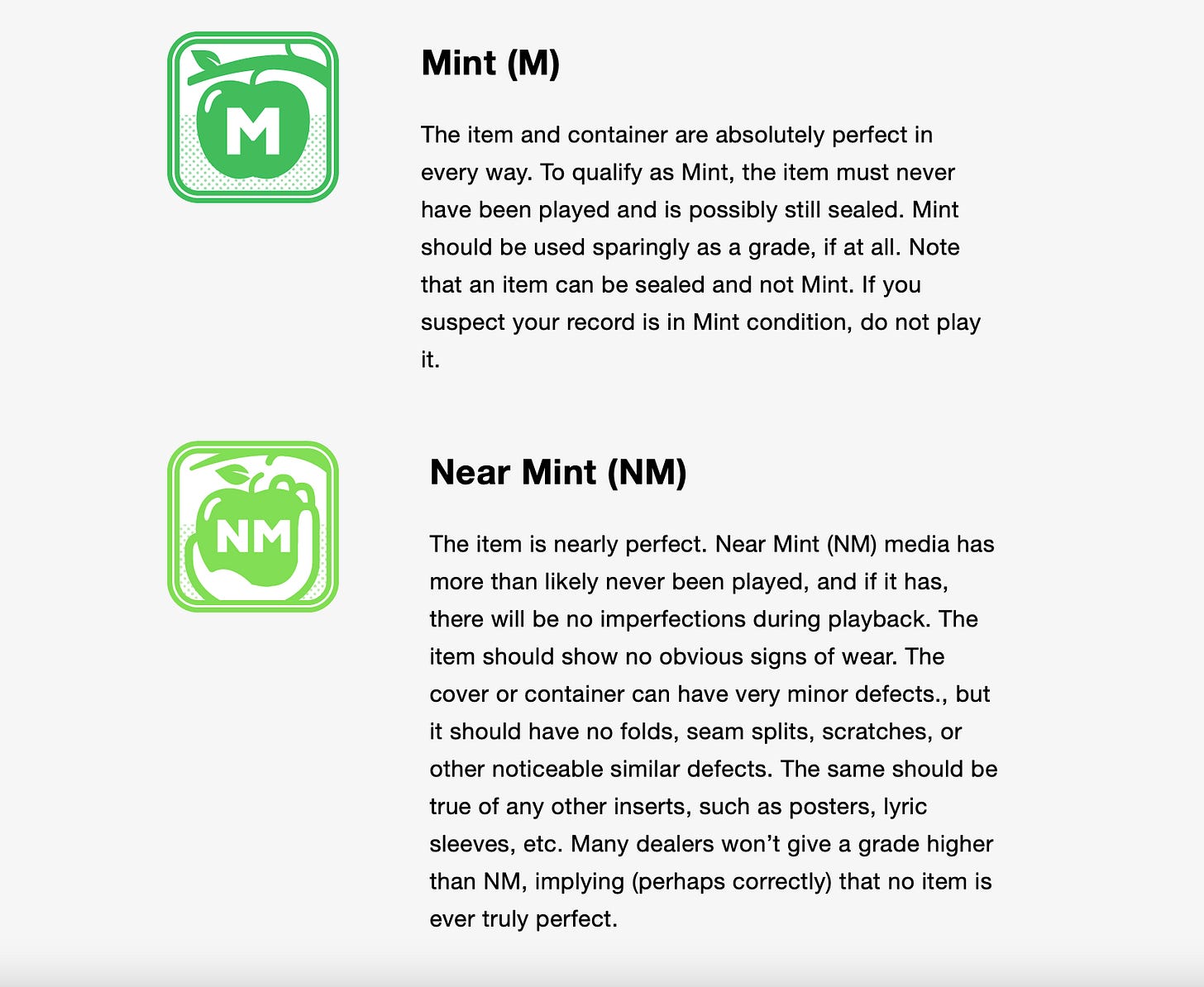Buying on Discogs
How to avoid common pitfalls and expand your collection from the comfort of your home
Discogs amalgamates a records database with a platform to buy and sell records online. It also hosts some community features such as groups, message boards and the like.
The Discogs database and the Discogs marketplace are separate but nicely integrated: you can search for records on the database, add them to your Discogs wantlist or collection, and check their value on the marketplace.
Why Discogs is great
Rare pressings from all over the world you can’t easily get elsewhere
Lower shipping costs when buying multiple items from the same seller
You support local record stores and independent sellers from around the globe
Free to use for buyers and collectors (sellers have to pay a fee)
What to watch out for
Some sellers have a bad reputation (incorrect, missing or mis-graded items)
Some prices may be inflated (always compare with other sources)
I buy on Discogs very often and, save some minor issues long ago, my transactions have always gone smoothly.
Today I’ll show you some tricks so you can also navigate it like a pro.
Identifying your version
Search for the “master release” first and identify which version(s) you want (or already own).
You can filter by format, country, year of release, and some other identifiers (e.g. barcodes).
As for countries, I usually stick to US, Europe (particularly Germany and the Netherlands), UK1, and Canada.2
Once you find what you need, add it to your wantlist or collection accordingly. When adding to your collection, take the time to grade your items: it will make your life easier if and when you want to resell.
Master release versus specific release
A common mistake some buyers make is not understanding the difference between accessing the marketplace from the master release page versus accessing it from the page of a specific release.
The confusion arises due to not reading the small print. You can buy from either page depending on how fussed you are about the specific version you want. When buying from the page of a specific release, your options will, obviously, be more limited.

Check the reviews section at the bottom of the page for information on sound and overall pressing quality as this can help you guide your choices.
Seller’s rating
As a rule, I never buy from anyone with less than 99.5% positive reviews. But this metric alone isn’t everything: sometimes there are simply not enough sellers with the pressing you want, so you have to make compromises.
You should also pay attention to:
The overall number of ratings: Someone with 99.2% positive reviews gathered from 20,000 ratings is likely to be more reliable and certainly more experienced than someone with 100% positive reviews but 100 ratings (or less).
The feedback itself: Click on the ratings link and check the negative and neutral reviews to analyse:
how recent they are;
whether the seller responded (and how); and
the chances that the buyer may have been an idiot, deliberately mean or simply inexperienced.
If you see a consistent history of complaints about mis-graded items or records not arriving, stay well away from that seller.
M or NM by default
Familiarise yourself with the grading system.
Generally, I only buy Mint or Near Mint records on Discogs and don’t go below VG+.
Near Mint means like new, so there is less room for interpretation.
Payment logistics
Make payment immediately after placing an order or, at the latest, within four days. Otherwise the order will be cancelled and you will get negative feedback by default. Yes, you also get feedback as a buyer (which is only fair).
I use PayPal for added protection. If things go wrong, you can always claim via Discogs and via PayPal.
To avoid delays, make sure your shipping address on PayPal matches your shipping address on Discogs.
Communication with the seller
It’s good practice to keep all communication with the seller friendly and professional.
Always check the seller’s terms as they may only ship on certain days. Many sellers do this as a side job so be patient if they don’t respond immediately.
If I don’t receive any contact (not even an acknowledgment) within 48 business hours, and the seller’s terms don’t mention a specific shipping schedule, I send the seller a polite message along the lines of:
“Hi, I trust you received payment for this order. Would you be able to let me know roughly when I can expect the item(s) to ship? Many thanks and best regards”.
Note the nuance of asking when the items will ship as opposed to when they will arrive. The latter will depend on the shipping method you chose, and is ultimately outside of the seller’s control.
Leaving feedback
Once you receive your items, and assuming all good, take the time to leave positive feedback. Sellers appreciate this, and it will help you build a stronger reputation as a buyer.
If there are any issues, send the seller a message on the Discogs order page before leaving negative or neutral feedback. Explain the issue(s) clearly and wait for their response. Most disputes can be settled by way of partial refunds and/or returns.
That’s all for today. I’d love to hear your thoughts in the comments. Do you buy on Discogs often? How has your experience been so far?
Thanks for reading or listening. Happy spinning… and shopping!
Wait, isn’t UK in Europe? Well… it’s complicated. Yes and no. Political differences aside, while technically in Europe (at least in geographical terms), we’ve always been known as an island (or group of islands) off the coast of Europe. In the vinyl world, you will sometimes find UK pressings which are distinct from their European counterparts.
I tend to choose these countries/territories because I trust their vinyl manufacturing industry to consistently provide superior results compared with others. There will always be room for exceptions here and there, so you should analyse each pressing on a case-by-case basis.









Thank you, Steve! I’m glad you found it helpful.
In my experience, the paper sleeves are not worth much, provided you still keep any original inner sleeve where there’s relevant artwork/liner notes/lyrics etc. I chuck away those white paper sleeves and always replace them immediately with anti-static ones. I do, however, always keep any inner sleeves where there’s artwork or lyrics, even if I don’t use them to hold the disc itself. Hope this helps!
These are great tips! I try to only get M or NM records too, though sometimes if they're priced to move (or if I want it bad enough), I'll grab something with a lower grade.
I've generally had good luck on Discogs. Part of that is down to buying from the same people more than once. Once vendor ships fast. Like, really fast, and I often get things w/in 2-3 days.